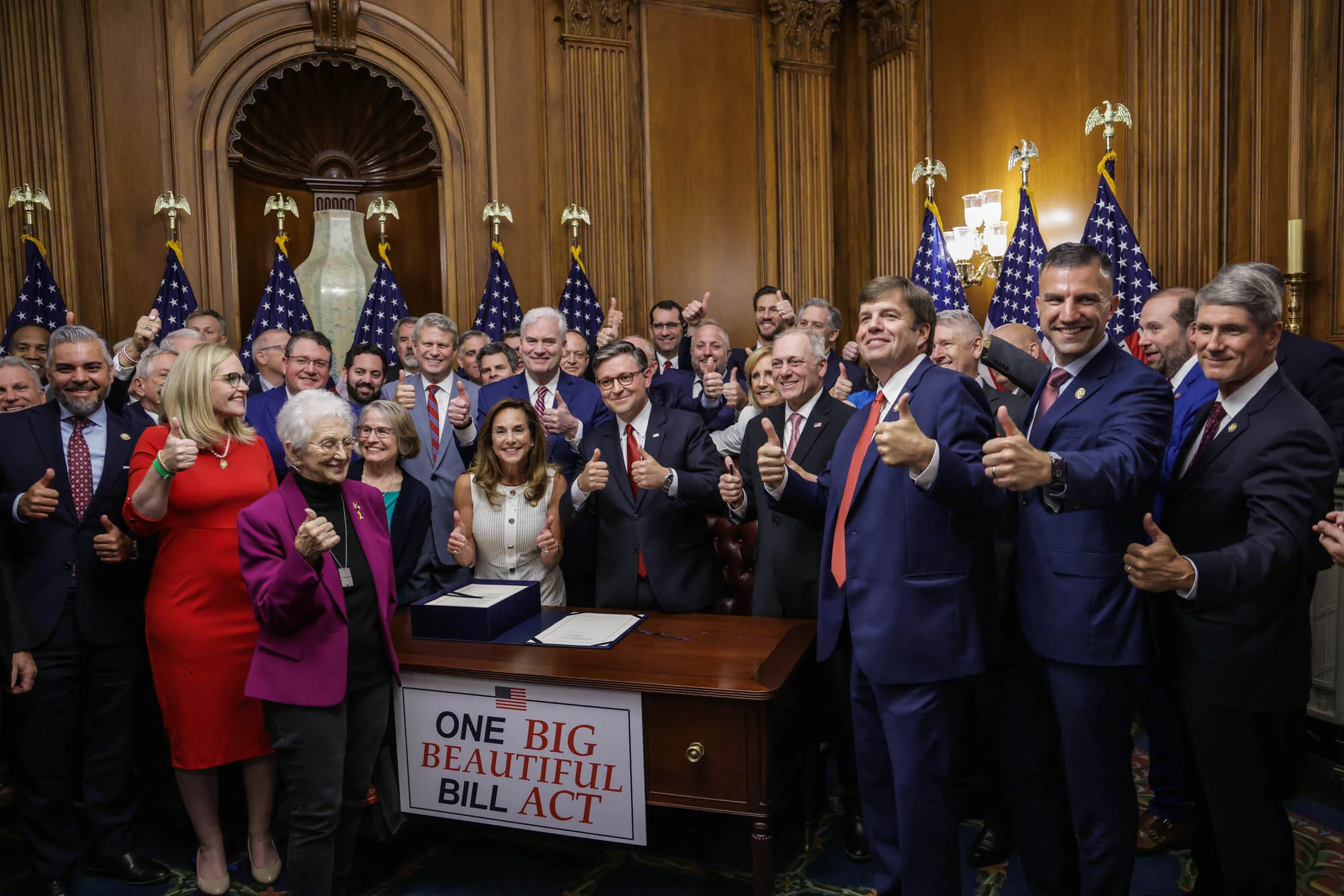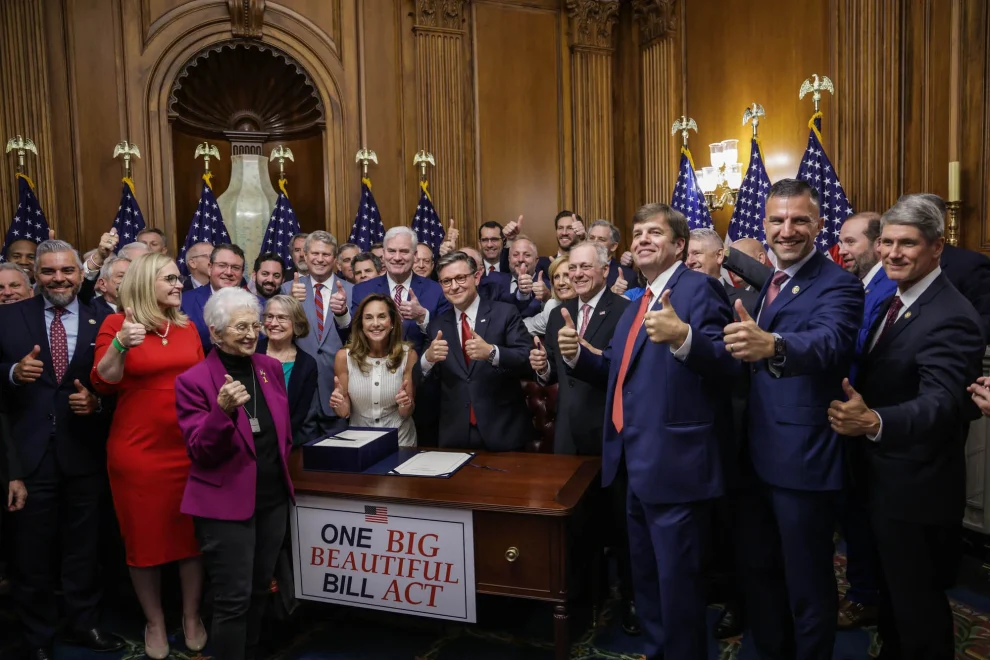President Donald Trump and Republican leaders are celebrating a major victory after leveraging their post-2024 trifecta to push a sweeping domestic policy bill through Congress at breakneck speed, overcoming internal divisions and sending it to the president’s desk just in time for their Independence Day deadline.
The narrow 218–214 vote, delivered just one day ahead of Trump’s self-imposed Friday deadline, capped more than four months of tense negotiations and internal strife. The process was marked by sharp ideological clashes and frequent friction between the House and Senate, where Republicans governed with little room for missteps given their razor-thin majorities.
EXCLUSIVE: HOW THUNE AND TRUMP GOT BEHIND ‘ONE BIG, BEAUTIFUL BILL’
“Some of you openly laughed at me when I said we’d pass it by Memorial Day,” Johnson said Thursday, referring to the initial vote on the House’s version of the bill, which passed on May 22.
“Then we said we’d get it done by July 4. We beat Memorial Day by four days, and we got this one done a day early.”
The speaker said the push to move quickly was not just strategic, it was rooted in conviction. “It’s belief,” he said. “We believed we’d be given this opportunity, and we didn’t want to waste it.”
With full control of the government, Johnson said Republicans felt a duty to act boldly and deliver results. He praised his members as principled public servants, adding with a smile, “Some of them are more fun to deal with than others.”

After a daylong rebellion by conservative Republicans over the bill’s $3.3 trillion deficit tag, House Speaker Mike Johnson (R-LA) and the president managed to win them over, securing support to advance a sweeping domestic agenda. Democrats remained unanimously opposed, casting the proposal as a political liability for the GOP and a gift for their own efforts to retake congressional majorities in 2026.
House Majority Leader Steve Scalise (R-LA) credited Johnson with holding the group together and praised Trump for being fully engaged throughout the process.
“I will tell you all the leaders I’ve served with, I don’t think there’s one that held this group together, complicated majority, narrow majority, narrowest we’ve ever had,” Scalise said. “Speaker Mike Johnson never one day wavered on his commitment.”
“Donald Trump absolutely was our closer, and Donald Trump never stopped,” Scalise added. “Every day was there in the fight. ‘Who do I need to call? What do I need to do?’ No president more directly engaged.”
Late-night calls, closed-door deals deliver bill to finish line
The legislation would extend the 2017 tax cuts, introduce new breaks for tips and overtime pay, inject $320 billion into the military and border enforcement, and cut spending on safety net programs such as Medicaid and food assistance, all while raising the federal debt ceiling by $5 trillion, enough to carry the government beyond the 2026 midterm elections.
With little room for error in the narrowly split House, Johnson and Trump mounted an aggressive push Wednesday to lock down the votes needed to advance the legislation. The president worked behind the scenes throughout the day, holding one-on-one meetings and dialing GOP skeptics, then amping up the pressure with a late-night Truth Social post.
“What are the Republicans waiting for???” he wrote. “What are you trying to prove??? MAGA IS NOT HAPPY, AND IT’S COSTING YOU VOTES.”
Reps. Andrew Clyde (R-GA), Keith Self (R-TX), Victoria Spartz (R-IN), Brian Fitzpatrick (R-PA), and Thomas Massie (R-KY) initially opposed the procedural motion, while eight others did not vote. But after Johnson pledged to keep the roll call open indefinitely, all but Fitzpatrick and Massie reversed course, paving the way for the measure to move forward.
“The president’s very engaged,” Johnson told reporters Thursday morning. “He was, you know, very helpful in the process. He helped answer questions and articulate his vision … and what this bill will mean for the country and his agenda … and how urgent it is for us to get it done, so I think it was very helpful. I’m really appreciative of his leadership.”

A steady stream of Republican lawmakers made their way through the West Wing on Wednesday as Trump leaned on personal persuasion to shore up support for his legislation. In addition to emphasizing the political stakes, Trump offered assurances about how key provisions would be carried out.
In the early hours of the morning, as GOP holdouts gathered in a backroom just off the House floor, Trump called lawmakers to break the stalemate. According to one former skeptic, the president pledged to aggressively wield executive power to crack down on green energy tax credits, assuring fiscal hardliners he would enforce the bill’s phaseouts if they backed his sweeping tax and spending overhaul.
“He did a masterful job of laying out how we could improve it, how he could use his chief executive office, use things to make the bill better,” Rep. Ralph Norman (R-SC) said during an interview on CNBC on Thursday.
“President Trump is going to use his powers to … make sure that a lot of these subsidies won’t remain in effect, you know, from here on out,” Norman added.
Republicans such as Norman have criticized the Senate’s drawn-out timeline for winding down certain energy tax credits and said securing firm commitments from the White House on that front was a key priority.
“I’m proud of those guys for working to make this bill as fiscally responsible as we could make it, and not jeopardize all the … successes, all the achievements that we made in the process,” Rep. Jodey Arrington (R-TX) told the Washington Examiner.
“I think Chip and Ralph and those guys have worked hard in the eleventh hour and 59th second to improve it,” Arrington added.
Earlier on Thursday, Scalise made clear that, despite lingering calls for changes, the window to revise the bill had closed. He added that GOP leaders reassured members there would be another shot at advancing unresolved priorities later this year, likely through a second budget bill. The appropriations process, Scalise noted, would also offer a path to pursue steeper cuts to federal agencies.
He described a tense final stretch, saying that every time the legislation seemed on the verge of collapse, leadership refused to let it fail.
“Every time it looked like it might die, we just didn’t give anybody that chance to let the bill go down,” he said.
House-Senate gauntlet tests GOP’s grip on power
The House narrowly passed its first version of the bill in May by a single vote, 215-214. Following four days of intense debate and a flurry of amendments, the Senate approved its own version on July 1 with a 51–50 margin. Three Republican senators opposed the measure, requiring Vice President JD Vance to cast the deciding vote.
The road to passage was anything but smooth. Republicans relied on the budget reconciliation process to bypass a Democratic filibuster in the Senate, a powerful tool that limited debate and allowed the bill to pass with a simple majority. But the fast-track process came with strict rules and constraints, forcing GOP leaders to navigate a minefield of procedural challenges and policy trade-offs. Several provisions were revised or scrapped altogether after the Senate parliamentarian raised objections, prompting late-night rewrites and backroom negotiations.
Senate Majority Leader John Thune (R-SD) emerged as a key negotiator during the final stretch in the Senate, working behind the scenes to unify the conference and steer the bill through a turbulent “vote-a-rama.”
“He understands what it takes to get a deal, wants to get a deal,” Thune said of Trump in a Sunday interview with the Washington Examiner. “And in many respects, he knows we’ve got to get it done here.”
INDEPENDENCE DAY IS ONE OF THE MOST DANGEROUS HOLIDAYS: HOW TO STAY SAFE
In the final hours, leadership scrambled to lock down support amid growing frustration from both fiscal hawks and policy purists, underscoring just how fragile and hard-fought the party’s legislative victory truly was. In the Senate, Republican leaders zeroed in on Sen. Lisa Murkowski (R-AK), working to address her concerns about the bill’s financial effect on Alaska.
The Alaska senator described her decision as “probably the most difficult and agonizing 24-hour legislative period that I’ve encountered, and I’ve been here quite a while.”
Despite her reservations, she highlighted several key wins that helped tip the scales, including added flexibility for SNAP benefits in Alaska, new funding for rural hospitals, and the removal of a proposed tax on solar and wind projects. Murkowski also reiterated her backing for extending the 2017 Trump tax cuts.
“At the end of the day, I had to weigh everything and put the needs of my state first,” she said.
Meeting the Independence Day deadline was a major feat, given the tight constraints of the reconciliation process and deep divisions within the GOP.
WHAT MADE IT INTO THE SENATE’S FINAL ‘BIG, BEAUTIFUL BILL’ AND WHAT DIDN’T
For weeks, Republican leaders scrambled to revise the bill, wrangle votes, and navigate procedural hurdles in both chambers. Even as Trump pushed Congress to pass his sweeping domestic policy bill by Friday, he also acknowledged the possibility that negotiations might stretch past the self-imposed deadline. Yet despite the chaos, they got it done, just in time for a planned July 4 signing ceremony.
“Believe me, tomorrow at the White House, you’re going to see a proud president who’s ready to deliver on his promise to the American people,” Scalise said.
Lauren Green contributed to this report.
























